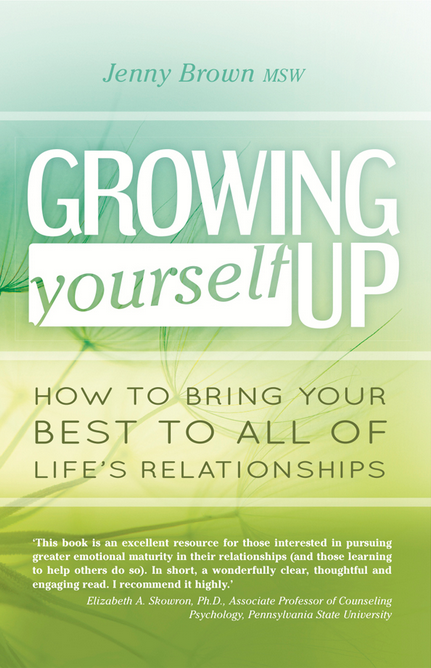We all need to grow ourselves up… so read this book
There are books that are sometimes unkindly described as “hard work”, by which we usually mean that reading should be a pleasure, and something about the writer’s style or prose has turned a pleasure into an unnecessary grind. (See also: most works of academic theology.)
But when I say Growing Yourself Up by Jenny Brown is hard work, it’s a compliment: this is one of the most frightfully necessary books I’ve had the pleasure of recommending. Let me explain.
 Jenny Brown is the founder and director of the Family Systems Institute in Sydney, where she is both a counsellor and trainer of other mental health professionals. Her particular focus in her work – and this book – is what’s called family systems theory, developed by a psychiatrist called Murray Bowen in the 1950s.
Jenny Brown is the founder and director of the Family Systems Institute in Sydney, where she is both a counsellor and trainer of other mental health professionals. Her particular focus in her work – and this book – is what’s called family systems theory, developed by a psychiatrist called Murray Bowen in the 1950s.
In brief, Bowen was a psychologist who developed a theory that issues might not develop just from the individual’s psyche but from your learned interactions with your family of origin. On one level, Bowen’s theory is unusual because it is based not on diagnosing and fixing the mental illness within you, but understanding and alleviating the common problem with all of us, and the way we relate to others.
In the years since, Bowen’s theory has become an increasingly popular understanding within psychology, and in this book, Brown takes her understanding of family systems theory  and brings it to bear on life. By which I mean, all of life.
and brings it to bear on life. By which I mean, all of life.
Through the book, Brown addresses each part of life in a cradle-to-the-grave chronology. So, part 1 looks at the foundations of adult maturity and the challenges of the adult coming to terms with their family of origin. Part 2 looks at leaving home, singleness and marriage, and parenting. Part 3 looks at relationships outside of the immediate family including work and religious beliefs. Part 4 looks at later encroaching issues such as divorce, depression and anxiety. And part 5 looks at midlife, ageing and illness.
You may have noticed that word “religion” in part 3: it’s important to note that Brown is a Christian. However, this is not a book written directly to a Christian audience – anybody could pick it up and read it – but she is also appealingly open about her Christian faith and the difference that’s made to her in her increasing maturity.
Maturity, as in the title, Growing Yourself Up, is the thread that runs throughout the book. What does it mean to be a more mature person, a person who responds in balance rather than in anxiety? What does it mean to be part of your family of origin and not immediately retreat back into the persona of your childhood? How do you navigate a marriage where one person is the pursuer and the other is the turtler? These are some of the important questions addressed here.
And the results, too, resound through all of life and relationships: “Growing maturity, based on seeing the patterns of relationship we’re part of, promotes more honesty, humility and improved health for us and for those we care about.”
Brown writes in a practical-first, and sometimes startlingly honest way. And it’s also a book that shines full of thoroughgoing wisdom, all the more amidst a backdrop of the pseudo-Christian pseudo-wisdom miracle cure literature that populates the shelves.
At this point, I’d usually add that “this book is not for everyone”, except I find myself in the strange situation of saying this book is for everyone: anyone who has had to negotiate tricky issues of family of origin; anyone who has had to work out how to be single; anyone who has had to navigate relationships with people at work; anyone who has had, or will have, to deal with ageing and dying. In short, everyone. The only people who might be exempt would be those who already know the territory of family systems theory, but even then, I’d find this a helpful first-stop reference point.
Reading this book is hard work, but it’s hard work not in the sense of reading, but hard work in the sense of applying it to your life. It’s hard work in the sense that “growing yourself up”, and applying growing maturity to the key relationships in your life is hard work … and this book will make knowing that and doing that easier.
As Brown herself says,
“You’ve probably figured out by now that the message of this book isn’t about miracle pathways to growing up. It’s based on the view that … it’s possible to tone down immature ways of relating that get in the way of your and others’ progress. In a recent counselling session, a middle-aged woman wisely declared: ‘I used to get impatient about my slow progress but I now see that being more effective and mature in life is like running a marathon.’ ”
Email This Story
Why not send this to a friend?


